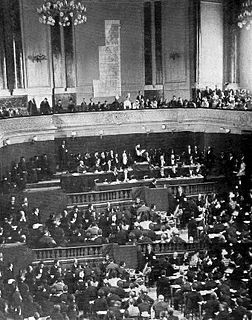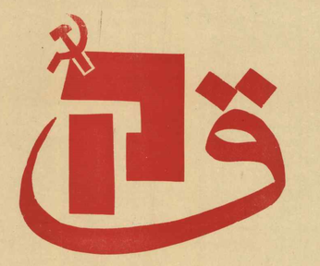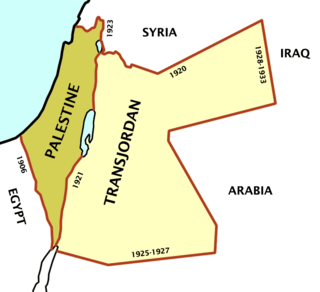The Land of Israel is the birthplace of the Jewish people, the place where the Hebrew Bible was composed and the birthplace of Judaism and Christianity. It contains sites sacred to Judaism, Christianity, Islam, Samaritanism, Druze and the Bahá'í Faith.

Zionism is the national movement of the Jewish people that supports the re-establishment of a Jewish homeland in the territory defined as the historic Land of Israel. Modern Zionism emerged in the late 19th century in Central and Eastern Europe as a national revival movement, both in reaction to newer waves of antisemitism and as an imitative response to other nationalist movements. Soon after this, most leaders of the movement associated the main goal with creating the desired state in Palestine, then an area controlled by the Ottoman Empire.

The United Nations Partition Plan for Palestine was a proposal by the United Nations, which recommended a partition of Mandatory Palestine at the end of the British Mandate. On 29 November 1947, the UN General Assembly adopted the Plan as Resolution 181 (II).
The Quebec general election of 1944 was held on August 8, 1944 to elect members of the Legislative Assembly of the Province of Quebec, Canada. The Union Nationale, led by former premier Maurice Duplessis, defeated the incumbent Quebec Liberal Party, led by Adélard Godbout. This was the first Quebec provincial election in which women were allowed to vote, having been granted suffrage at the provincial level in 1940 and at the federal level in 1919.

Herbert Louis Samuel, 1st Viscount Samuel, was a British Liberal politician who was the party leader from 1931 to 1935. He was the first nominally-practising Jew to serve as a Cabinet minister and to become the leader of a major British political party. Samuel was the last member of the Liberal Party to hold one of the four Great Offices of State. He also served as a diplomat.

The Zionist Congress was established in 1897 by Theodor Herzl as the supreme organ of the Zionist Organization (ZO) and its legislative authority. In 1960 the names were changed to World Zionist Congress and World Zionist Organization (WZO), respectively. The World Zionist Organization elects the officers and decides on the policies of the WZO and the Jewish Agency. The first Zionist Congress was held in Basel, Switzerland in 1897.
From the start of political Zionism in the 1890s, Haredi leaders voiced objection to its secular orientation, and before the establishment of the State of Israel, the vast majority of Haredi Jews were opposed to Zionism. This was chiefly due to the concern that secular nationalism would replace the Jewish faith and the observance of religion, and the view that it was forbidden for the Jews to re-constitute Jewish rule in the Land of Israel before the arrival of the Messiah. Those rabbis who did support Jewish settlement in Palestine in the late 19th century had no intention of conquering Palestine from the Ottoman Turks, and some preferred that only observant Jews be allowed to settle there.

The Jewish Party, in full Jewish Party of Romania or Jewish National Party, was a right-wing political party in Romania, representing Jewish community interests. It originally followed an undercurrent of Zionism, promoting communitarianism as a prerequisite of resettlement in Palestine, and later progressed toward Religious Zionism and Revisionism. Founded by Tivadar Fischer, József Fischer, and Adolphe Stern, it had particularly strong sections in Transylvania and Bessarabia. In the Old Kingdom, where it registered least support, it was mainly represented by A. L. Zissu and Renașterea Noastră newspaper.

Yitzhak Gruenbaum was a noted leader of the Zionist movement among Polish Jewry in the interwar period and of the Yishuv in Mandatory Palestine. Gruenbaum was the first Interior Minister of the State of Israel.
Zionism as an organized movement is generally considered to have been founded by Theodor Herzl in 1897. However, the history of Zionism began earlier and is related to Judaism and Jewish history. The Hovevei Zion, or the Lovers of Zion, were responsible for the creation of 20 new Jewish settlements in Palestine between 1870 and 1897.
The Jewish Labour Movement, known as Poale Zion from 1903 to 2004, is the oldest Socialist society affiliated to the Labour Party. It is part of the Poale Zion movement, and as such is also affiliated with the World Labour Zionist Movement, has fraternal ties to the Israeli Labour Party and has unofficial ties to the Habonim Dror Labour Zionist youth movement.

The General Jewish Labour Bund in Poland was a Jewish socialist party in Poland which promoted the political, cultural and social autonomy of Jewish workers, sought to combat antisemitism and was generally opposed to Zionism.
Elections to the Assembly of Representatives were held in Mandate Palestine on 5 January 1931. Mapai emerged as the largest party.

Moshe Sneh was a Haganah commander and an Israeli politician. One of the founders of Mapam, he later joined the Israeli Communist Party (Maki).

Maki was a communist political party in Israel. It is not the same party as the modern-day Maki, which split from it during the 1960s and later assumed its name.














